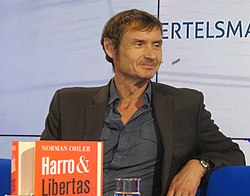Norman Ohler | |
|---|---|
 | |
| Born | 1970 (age 54–55) |
| Occupation | Author, screenwriter, journalist |
| Language | German, English |
| Nationality | German |
在本次訪談中,諾曼·奧勒 (Norman Ohler) 詳細闡述了他的著作《閃電戰》(Blitzed),他認為如果沒有甲基苯丙胺,納粹的戰鬥力不會如此強大,但甲基苯丙胺也是導致他們最終失敗的原因之一。
他也解釋了希特勒本人用來提升個人魅力的藥物。
在他的另一本書《迷幻》(Tripped) 中,他回顧了 LSD 的歷史,從納粹實驗到 MKUltra 和美國中央情報局 (CIA),並就這種備受爭議的藥物發表了個人看法。
諾曼·奧勒是一位作家、小說家和編劇,以其廣受歡迎的歷史著作《閃電戰:第三帝國的毒品》(Blitzed: Drugs in the Third Reich) 而聞名。
他的最新著作《迷幻:納粹德國、中央情報局和迷幻時代的黎明》(Tripped: Nazi Germany, The CIA and the Dawn of the Psychedelic Age) 探討了美國政府在發現納粹在大屠殺期間進行實驗後,對 LSD 作為精神控制藥物的研究。
點擊個人簡介中的連結觀看完整訪談。
- 《亢奮戰:納粹嗑藥史》(Der totale Rausch: Drogen im Dritten Reich/ Blitzed: Drugs in Nazi Germany)
- 《生活方程式》( Die Gleichung des Lebens)
- 《波希米亞人:第三帝國柏林地下抵抗運動中的愛情與犧牲》(The Bohemians: The Lovers Who Led Germany’s Resistance Against the Nazis)
In 1995 he published Die Quotenmaschine, the world's first hypertext novel in German. His second novel, Mitte, was published in 2001 and praised by Der Spiegel as his 'masterpiece', followed by his third, Stadt des Goldes (city of gold) in 2002, set in Ponte City.[2] These three novels form Ohler's City Trilogy.
In 2004, Ohler was invited by the German Goethe-Institut to act as writer-in-residence in Ramallah. There, Ohler wrote about the life of the Palestinians in the West Bank and published the last interview Yassir Arafat gave, shortly before his death.[3] Ohler has also worked as writer-in-residence in Tel Aviv and Jerusalem.
In 2008, he co-wrote the movie Palermo Shooting with Wim Wenders, starring Dennis Hopper.
Blitzed: Drugs in Nazi Germany
In September 2015, Kiepenheuer & Witsch published Ohler's first non-fiction work, Der totale Rausch: Drogen im Dritten Reich; the book appeared in English as Blitzed: Drugs in Nazi Germany in 2016.[4][5] Upon publication in the US, it became a New York Times bestseller.[6] In the book, Ohler researches what role psychoactive drugs, particularly stimulants such as methamphetamine, played in the military history of World War II, concluding that many of the German military and political leadership—especially Adolf Hitler—used psychoactive drugs during the war.[7][8][9]
The book was praised by some historians: Antony Beevor calls Blitzed 'a remarkable work of research. Ohler's account makes us look at this densely studied period rather differently'; Ian Kershaw describes it as 'very good and extremely interesting ... a serious piece of scholarship very well-researched' and Hans Mommsen, one of Germany's leading historians, refers to Blitzed as 'changing the overall picture'.[10][11]
However, other historians disagreed with Ohler's approach. German historian, Nikolaus Wachsmann wrote that Ohler "appears to mix fact and fiction. [...] He spices up the evidence, throws in pop culture references ("Teutonic Easy Riders"), and garnishes it with snazzy puns ("High Hitler"). It remains to be seen if this recipe will appeal to anglophone readers. To borrow Ohler's style: will they experience a big buzz, or a bad trip?".[12] Dagmar Herzog expressed the view that 'Ohler's analysis does not withstand close scrutiny. (…) Anyone seeking a deepened understanding of the Nazi period must be wary of a book that provides more distraction and distortion than clarification.'[13] James Pugh judged that while the book is an 'engaging and entertaining piece of journalistic history', it was 'troubling based on its tone, scholarship and engagement with the literature'.[14] Richard J. Evans, Regius Professor of History at the University of Cambridge from 2008 to 2014, author of History of the Third Reich, called Blitzed 'a crass and dangerously inaccurate account'.[15] He also wrote that the book is 'morally and politically dangerous', because it implies that Hitler was not responsible for his actions. Ohler rejected this claim.[16] Evans replied: "'Blitzed' belongs not in the world of serious history, but in the new landscape of 'post-truth' and 'alternative facts'".[17]
The Bohemians – The Lovers who led Germany's Resistance against the Nazis
In 2020, Ohler's second non-fiction book appeared: The Bohemians – The Lovers who led Germany's Resistance against the Nazis. "A detailed and meticulously researched tale about a pair of young German resisters that reads like a thriller", writes The New York Times.[18]
Publications
Novels
- Die Quotenmaschine (1998)
- Mitte (2001)
- Stadt des Goldes = city of gold (2003) – published in South Africa as Ponte City
- Die Gleichung des Lebens (2017)
Non-fiction
- Blitzed: Drugs in Nazi Germany[19][20] (2016), ISBN 0241256992
- The Bohemians – The Lovers who led Germany's Resistance against the Nazis (2020), ISBN 1328566307
- Tripped: Nazi Germany, The CIA and the Dawn of the Psychedelic Age (2024), ISBN 978-0-358-64650-1
Films
- Palermo Shooting, screenwriter[21][22] (2008)
沒有留言:
張貼留言